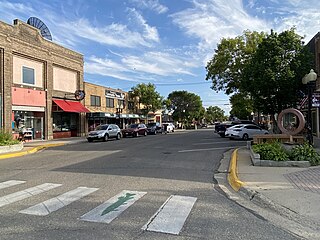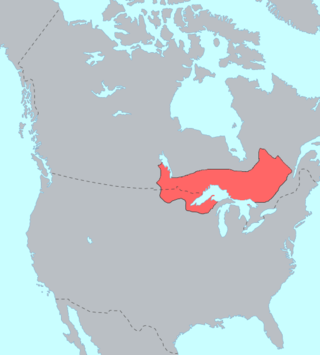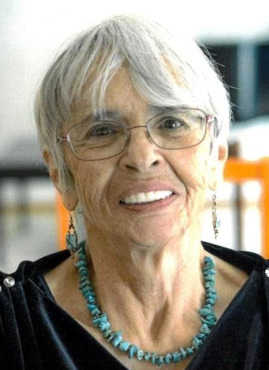
Bemidji is a city and the county seat of Beltrami County,in northern Minnesota,United States. The population was 14,574 at the 2020 census. According to 2022 census estimates,the city is estimated to have a population of 15,946,making it the largest commercial center between Grand Forks,North Dakota and Duluth.

The Ojibwe are an Anishinaabe people whose homeland covers much of the Great Lakes region and the northern plains,extending into the subarctic and throughout the northeastern woodlands. The Ojibwe,being Indigenous peoples of the Northeastern Woodlands and of the subarctic,are known by several names,including Ojibway or Chippewa. As a large ethnic group,several distinct nations also consider themselves Ojibwe,including the Saulteaux,Nipissings,and Oji-Cree.

Ojibwe,also known as Ojibwa,Ojibway,Otchipwe,Ojibwemowin,or Anishinaabemowin,is an indigenous language of North America of the Algonquian language family. The language is characterized by a series of dialects that have local names and frequently local writing systems. There is no single dialect that is considered the most prestigious or most prominent,and no standard writing system that covers all dialects.

The Red Lake Indian Reservation covers 1,260.3 sq mi in parts of nine counties in Minnesota,United States. It is made up of numerous holdings but the largest section is an area around Red Lake,in north-central Minnesota,the largest lake in the state. This section lies primarily in the counties of Beltrami and Clearwater. Land in seven other counties is also part of the reservation. The reservation population was 5,506 in the 2020 census.

The White Earth Indian Reservation is home to the White Earth Band,in northwestern Minnesota. It is the largest Indian reservation in the state by land area. The reservation includes all of Mahnomen County,plus parts of Becker and Clearwater counties in the northwest part of the state along the Wild Rice and White Earth rivers. The reservation's land area is 1,093 square miles (2,830 km2). The population was 9,726 as of the 2020 census,including off-reservation trust land. The White Earth Indian Reservation is one of six bands that make up the Minnesota Chippewa Tribe,their governing body for major administrative needs. It is about 225 miles (362 km) from Minneapolis–Saint Paul and roughly 65 miles (105 km) from Fargo–Moorhead.
The White Earth Band of the Minnesota Chippewa Tribe,also called the White Earth Nation,is a federally recognized Native American band in northwestern Minnesota. The band's land base is the White Earth Indian Reservation.

The Leech Lake Reservation is an Indian reservation located in the north-central Minnesota counties of Cass,Itasca,Beltrami,and Hubbard. The reservation forms the land base for the federally recognized Leech Lake Band of Ojibwe,one of six bands comprising the Minnesota Chippewa Tribe,organized in 1934. The Leech Lake Reservation has the second highest population of any reservation in Minnesota with White Earth Nation being the largest Minnesota Ojibwe tribe,Leech Lake Nation has a resident population of 11,388 indicated by the 2020 census.

The Leech Lake Band of Ojibwe,also known as the Leech Lake Band of Chippewa Indians or the Leech Lake Band of Minnesota Chippewa Tribe is a federally recognized Ojibwe band located in Minnesota and one of six making up the Minnesota Chippewa Tribe. The band had 9,426 enrolled tribal members as of March 2014. The band's land base is the Leech Lake Indian Reservation,which includes eleven communities aggregated into three districts,as defined in the tribal constitution.
Mille Lacs Indian Reservation is the popular name for the land-base for the Mille Lacs Band of Ojibwe in Central Minnesota,about 100 miles (160 km) north of Minneapolis-St. Paul. The contemporary Mille Lacs Band reservation has significant land holdings in Mille Lacs,Pine,Aitkin and Crow Wing counties,as well as other land holdings in Kanabec,Morrison,and Otter Tail Counties. Mille Lacs Indian Reservation is also the name of a formal Indian reservation established in 1855. It is one of the two formal reservations on which the contemporary Mille Lacs Band retains land holdings. The contemporary Mille Lacs band includes several aboriginal Ojibwe bands and villages,whose members reside in communities throughout central Minnesota.
The Mille Lacs Band of Ojibwe,also known as the Mille Lacs Band of Chippewa Indians, is a federally recognized American Indian tribe in east-central Minnesota. The Band has 4,302 members as of 2012. Its homeland is the Mille Lacs Indian Reservation,consisting of District I,District II,District IIa,and District III.
Maude Kegg (1904–1996) was an Ojibwa writer,folk artist,and cultural interpreter from Minnesota. She was a citizen of the Mille Lacs Band of the Minnesota Chippewa Tribe.

Francis Xavier Pierz was a Slovenian-American Roman Catholic priest and missionary to the Ottawa and Ojibwe Indians in present-day Michigan,Wisconsin,Ontario,and Minnesota. Because his letters convinced numerous Catholic German Americans to settle in Central Minnesota after the Treaty of Traverse des Sioux in 1851,Fr. Pierz is referred to as the "Father of the Diocese of Saint Cloud."

David Treuer is an American writer,critic,and academic. As of 2019,he had published seven books,and his 2019 book,The Heartbeat of Wounded Knee:Native America from 1890 to the Present, was a National Book Award Finalist. His work published in 2006 was noted as among the best of the year by several major publications. He published a book of essays in 2006 on Native American fiction that stirred controversy by criticizing major writers of the tradition and concluding,"Native American fiction does not exist."
The St. Croix Chippewa Indians of Wisconsin are a federally recognized tribe of Ojibwe people located in Northwest Wisconsin,along the St. Croix River valley and watershed. The band had 1,054 members as of 2010.
Chippewa is an Algonquian language spoken from upper Michigan westward to North Dakota in the United States. It represents the southern component of the Ojibwe language.

Roger Jourdain was an Ojibwe civic leader who served as chairman of the Red Lake Band of Chippewa from 1959 to 1990. Jourdain is credited with protecting Red Lake's extensive tribal sovereignty and improving tribal infrastructure during his tenure in office.

Hole-in-the-Day was a prominent chief of the Mississippi band of Ojibwe/Chippewa in Minnesota. The native pronunciation has been written with different spellings due different speakers variance in their enunciation,such as Bagone-giizhig,Bagwunagijik,Bug-o-nay-ki-shig,Pugonakeshig or Puk-O-Nay-Keshig. Hole-in-the-Day has also been called Hole-in-the-Sky. The name refers to a dream in which the guardian spirit was seen through an opening in the clouds. It also refers to the Anishinaabek name for the constellation of the same name,also known as the Pleiades.

Dodging Bullets—Stories from Survivors of Historical Trauma is a documentary film on historical trauma in Indian Country,co-directed by Kathy Broere (Blackfeet),Sarah Edstrom,Jonathan Thunder,and Bob Trench,and produced by Larry Long with soundtrack by Keith Secola. The film focuses on historical events and how they inter-generationally affect the Indigenous population in North America today.

Tara Houska Zhaabowekwe is a tribal attorney,land defender and climate justice activist.

Margaret "Peggy" Seelye Treuer (1943–2020) was an American Ojibwe judge and lawyer. She was Minnesota's first Native American woman lawyer,working as a federal magistrate and tribal court judge for the Bois Forte Band of Chippewa,the Red Lake Nation,and the Leech Lake Indian Reservation. A member of the Leech Lake Band of Ojibwe,she volunteered with the Native American Rights Fund and worked for the reestablishment of the Menominee Indian Reservation. She earned degrees from the law school of the Catholic University of America and St. Luke's School of Nursing. She received a Lifetime Achievement Award from the National Association of Women Judges.














